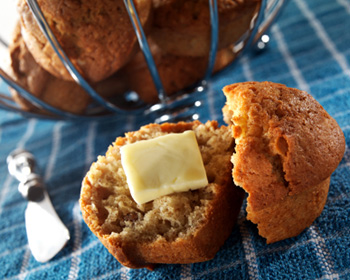It's easy to get answers about health and nutrition! Just send your question by email to [email protected] and Dr. Harlan will respond to selected questions of general interest. Answers will be posted in the Ask Dr. Gourmet newsletter (sign up now!) and archived in the Ask Dr. Gourmet section of the website.
Please note that the Ask Dr. Gourmet feature is restricted to questions regarding food and nutrition. Due to the many questions we receive, not all questions may be answered. For more specific questions about your individual health, please contact your doctor. About Timothy S. Harlan, MD, FACP, CCMS | Terms of Use | Privacy Policy
Ask Dr. Gourmet
Is butter better than spreads containing olive oil?
We've been eating Smart Balance buttery spread with extra virgin olive oil. Am really confused by what we should and should not be eating. This has palm fruit oil along with a lot of other ingredients. Is it wiser to eat butter, which has only pasteurized cream and natural flavorings, or Smart Balance which has an extended list of ingredients?
Dr. Gourmet Says...

Choosing what fat to use can be a challenge, but first and foremost it's important to not get too stressed about it. I love butter and I love olive oil and I think that spreads are OK as long as they are trans-fat-free.
Before I was diagnosed with Celiac disease I used to keep spreads like Smart Balance or Promise Buttery Spread on hand, but I didn't use them very often. I am cautious in my use of any fat, whether it's butter, spread, olive oil, or bacon. For instance, I used to use spreads for baking muffins and such, and would use Smart Balance Light on my pancakes. I didn't then - and still don't - spread fat such as butter on my bread in general, but when I do put fat on my bread I'm more likely to dip it in great quality extra virgin olive oil.
It's OK to use spreads every now and then, and olive oil (carefully), and great quality butter. As with all ingredients, too much of a good thing is just that: too much.
Thanks for writing,
Timothy S. Harlan, MD, FACP, CCMS
Dr. Gourmet
